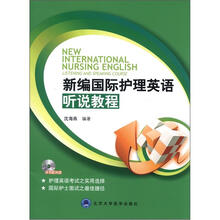新编国际护理英语听说教程

第一部分 临床医患对话
Surgical Problems(外科疾病)
Dialogue A Scalp Hematoma(头皮血肿)
Dialogue B Colostomy(结肠造瘘术)
Dialogue C Hip Fracture(髋骨骨折)
Dialogue D Kidney Transplantation(肾移植)
Internal Medical Problems(内科疾病)
Dialogue A Influenza(流行性感冒)
Dialogue B Viral Myocarditis(病毒性心肌炎)
Dialogue C Acute Gastritis(急性胃炎)
Dialogue D UTI(尿路感染)
Gynaecology and Obstetrics Problems(妇产科疾病)
Dialogue A Vaginitis(阴道炎)
Dialogue B Uterine Fibroid(子宫肌瘤)
Dialogue C Contraceptive Consultation(避孕咨询)
Dialogue D Childbirth Instruction(分娩指导)
Pediatric Problems(儿科疾病)
Dialogue A URI and Bronchitis(上呼吸道感染和支气管炎)
Dialogue B Infant Seizures(小儿抽搐)
Dialogue C Thrush(鹅口疮)
Dialogue D Infant Eczema(婴儿湿疹)
Psychological Problems(精神科疾病)
Dialogue A Neurasthenia Disorder(神经衰弱症)
Dialogue B Social Phobia(社交恐怖症)
第二部分 国际护士经典面试问题:基础护理相关问题
4.How many years' education did you have before you started learning nursing?
5.Where did you receive your nursing education?
7.Can you tell me something about your working background?
9.What do you think the relationship between nursing and medicine?
10.Can you tell me something about your hospital?
11.What were the subjects you learned at the nursing school?
13.Have you ever worked in other departments?
14.What nursing skills are you specially good at?
15.What kind of patients have you ever taking care of?
16.On a regular basis, how many patients do you need to look after?
17.How many hours work is legally requested for you to carry out in a week?
18.What's your routine work when you are on duty?
19.How many doctors and nurses are there in your hospital?
20.How many beds are there available in your hospital?
21.Is there any prominent feature in your hospital?
22.Are you good at operating modern equipments to provide care for the patients? Try to set up examples
23.What's the most importance in nursing practice?
24.What are the most common patients you've cared in your work at the hospital?
25.What nursing techniques have you learned?
26.What are the obligations the emergency nurses should take?
27.How do you assist the doctors in performing first-aid?
28.What is the normal limit of blood pressure for adults?
29.What are the normal pulse rate ranges for different age groups?
30.What should you react if your patient's condition has suddenly getting worse?
31.How do you take the infant's temperature?
33.What should you do before giving oral medication to the patient?
34.Do you know about “Seven verifications” and "Three check-ups" ?
……
第三部分 国际护士经典面试问题:专科护理相关问题
第四部分 OET口语考试经典场景及学生练习模板
第五部分 基础听力:20段慢速英语摘自美国VOA健康报告
第六部分 中级听力:10段常速英语摘自美国VOA健康报告
Surgical Problems(外科疾病)
Dialogue A Scalp Hematoma(头皮血肿)
Dialogue B Colostomy(结肠造瘘术)
Dialogue C Hip Fracture(髋骨骨折)
Dialogue D Kidney Transplantation(肾移植)
Internal Medical Problems(内科疾病)
Dialogue A Influenza(流行性感冒)
Dialogue B Viral Myocarditis(病毒性心肌炎)
Dialogue C Acute Gastritis(急性胃炎)
Dialogue D UTI(尿路感染)
Gynaecology and Obstetrics Problems(妇产科疾病)
Dialogue A Vaginitis(阴道炎)
Dialogue B Uterine Fibroid(子宫肌瘤)
Dialogue C Contraceptive Consultation(避孕咨询)
Dialogue D Childbirth Instruction(分娩指导)
Pediatric Problems(儿科疾病)
Dialogue A URI and Bronchitis(上呼吸道感染和支气管炎)
Dialogue B Infant Seizures(小儿抽搐)
Dialogue C Thrush(鹅口疮)
Dialogue D Infant Eczema(婴儿湿疹)
Psychological Problems(精神科疾病)
Dialogue A Neurasthenia Disorder(神经衰弱症)
Dialogue B Social Phobia(社交恐怖症)
第二部分 国际护士经典面试问题:基础护理相关问题
4.How many years' education did you have before you started learning nursing?
5.Where did you receive your nursing education?
7.Can you tell me something about your working background?
9.What do you think the relationship between nursing and medicine?
10.Can you tell me something about your hospital?
11.What were the subjects you learned at the nursing school?
13.Have you ever worked in other departments?
14.What nursing skills are you specially good at?
15.What kind of patients have you ever taking care of?
16.On a regular basis, how many patients do you need to look after?
17.How many hours work is legally requested for you to carry out in a week?
18.What's your routine work when you are on duty?
19.How many doctors and nurses are there in your hospital?
20.How many beds are there available in your hospital?
21.Is there any prominent feature in your hospital?
22.Are you good at operating modern equipments to provide care for the patients? Try to set up examples
23.What's the most importance in nursing practice?
24.What are the most common patients you've cared in your work at the hospital?
25.What nursing techniques have you learned?
26.What are the obligations the emergency nurses should take?
27.How do you assist the doctors in performing first-aid?
28.What is the normal limit of blood pressure for adults?
29.What are the normal pulse rate ranges for different age groups?
30.What should you react if your patient's condition has suddenly getting worse?
31.How do you take the infant's temperature?
33.What should you do before giving oral medication to the patient?
34.Do you know about “Seven verifications” and "Three check-ups" ?
……
第三部分 国际护士经典面试问题:专科护理相关问题
第四部分 OET口语考试经典场景及学生练习模板
第五部分 基础听力:20段慢速英语摘自美国VOA健康报告
第六部分 中级听力:10段常速英语摘自美国VOA健康报告
沈海燕(Rana),护士出身,后于同济大学进修,曾先后在国内外多家医院中做临床护理和管理超过10年。2000年开始坚持不懈地自学基础英语和医学专业英语。曾在北京外资医院中担任口译,在某培训机构担任雅思口语主讲教师,并在一些高端培训中担任主讲教师,全程英文授课。应邀为一些医疗机构量身定做临床实用英语、涉外礼仪及医护礼仪培训。在卫生部远程护理英语教育中主讲听说读写课程。曾先后三次参加雅思考试,听说成绩在75分以上,并于2007年参加OET考试,考得听力B、口语B、阅读B和写作B。
现受聘于首都医科大学国际学院,主讲专业英语、雅思英语。
现受聘于首都医科大学国际学院,主讲专业英语、雅思英语。
《新编国际护理英语听说教程》参考美国RN(注册护士)教材和澳大利亚护理本科教材,涵盖面较广,并尽量避免与国内已出版的护理英语书籍重复。本书首次收录了精神科相关的口语练习,因为精神科护理在国际护理专业的课程中至关重要,没有这方面的学习就不可能成为真正的国际护士。本书在内容上从易到难,听说结合,可以毫不夸张地说是一本专业护理英语的听说大全。
比价列表
公众号、微信群
 缺书网
缺书网微信公众号
 扫码进群
扫码进群实时获取购书优惠







